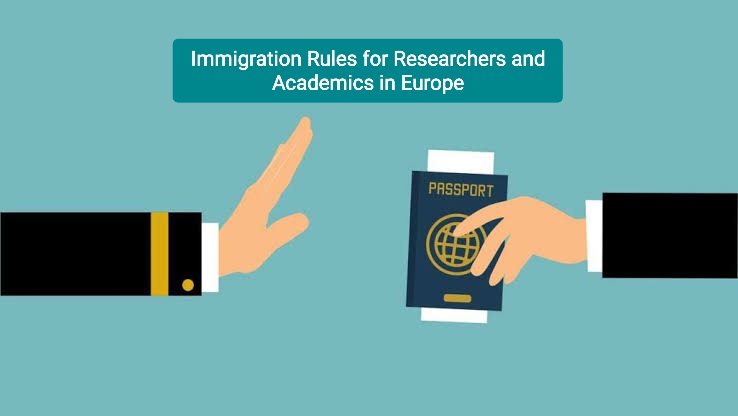Every year, thousands of scholars from around the world pack their bags and head to Europe. Some might probably be thinking what they go there to do. Well, they go to pursue research, lecture, or collaborate with institutions across the continent.
Europe is known also for its strong focus on education and innovation. Countries like Germany, France, the Netherlands, and Sweden have top-ranking universities and research centers that are always welcoming fresh minds from abroad.
But as exciting as this journey sounds, the process can get a bit tricky. Immigration rules for researchers and academics vary from one country to another. Some countries roll out the red carpet with special researcher visas, while others tie the process closely to job offers or institutional sponsorship.
You’ll also need to know what documents are expected, how long you can stay, and if you can bring your family. The goal of this article is to break down these rules in the simplest way possible, so you’re not stuck.
Immigration Rules for Researchers and Academics in Europe
In this guide, we’re going to break it down in a simple way for you to understand. So, if you’re a researcher or a professor looking to relocate to Europe, keep reading.
EU Blue Card Scheme
One of the most common ways researchers and academics can move to Europe is through the EU Blue Card. Think of it as a work visa for highly skilled professionals. It’s available in most EU countries (except for Ireland and Denmark), and it’s meant for non-EU nationals who have a university degree and a job offer with a certain salary.
For researchers and academics, this is great news because they usually meet the educational requirement easily. The salary threshold depends on the country, but it’s generally lower for people working in science, technology, or academic fields.
With the EU Blue Card, you can live and work in that country for up to four years, and after a certain period (usually around 33 months), you can apply for permanent residency. Some countries even allow family reunification, which means you can bring your spouse and kids with you.
Hosting Agreement (Researcher Directive 2016/801/EU)
This is one rule specifically designed for researchers coming from outside the EU. It allows recognized research institutions in Europe to host non-EU researchers through what’s called a “hosting agreement.” This is not the same as a work contract, but it works similarly.
Basically, if you get accepted into a research institution that is officially recognized by the country, they can issue this agreement, which you then use to apply for a residence permit. What’s cool about this rule is that it’s designed to be researcher-friendly. It’s fast, flexible, and allows you to move between EU countries under certain conditions.
Also, your family members can join you, and the permit is valid for the duration of your research project, usually with the possibility to extend. It’s one of the best options if you’re doing academic research that’s not tied to a commercial job offer.
Student-to-Researcher Route
Many researchers start as international students. If you’re already studying for a master’s or PhD in Europe, there’s a good chance you can switch your student visa to a researcher or academic residence permit after graduation.
This transition depends on the country, but most EU states have systems in place that allow international graduates to stay and look for research opportunities or academic jobs. For example, Germany gives graduates 18 months to find a job after completing their studies. France and the Netherlands have similar options.
If you land a post-doc role, teaching position, or get involved in funded research, you can apply for a permit as a researcher or academic without having to leave the country and start the process all over again.
Intra-EU Mobility for Researchers
Another major advantage of working in Europe is mobility. If you have a valid residence permit under the researcher directive, you can move between participating EU countries without applying for a whole new visa.
For example, if you’re doing research in France and you get invited to work on a project in Belgium for six months, you don’t need to go through the full immigration process again. The law allows researchers to move and work temporarily in another EU country with just a simple notification process.
This rule makes it easier for international researchers to collaborate across borders, attend conferences, or take part in multi-country research programs like Horizon Europe.
National Research Permits and Talent Programs
Individual countries also have national-level permits and special programs for attracting foreign researchers and academics.
For instance, the Netherlands has the “Highly Skilled Migrant” visa, which works well for academics. France runs the “Talent Passport – Researcher” program that’s specifically for people who want to come to France for research purposes. Germany has similar pathways under its Residence Act for scientists, teachers, and researchers.
These national programs usually offer quick processing, long-term residency, and support for bringing your family. Some even offer tax benefits for foreign researchers or support with housing and integration.
Recognition of Qualifications
Before you can start working, some countries may require your qualifications to be recognized. This depends on the country and the role. For academic positions in universities, your degree might be accepted as-is. But for government or public sector research jobs, you might need to have your credentials evaluated by an official body.
It’s not usually a dealbreaker, but it’s something to check before you apply. Each country has its own process for recognizing foreign degrees, and it’s best to start this early so it doesn’t delay your visa or job offer.
Language Requirements and Integration
Though English is widely used in academic and research settings across Europe, some countries might expect you to have a basic knowledge of the local language—especially if your role involves teaching or public engagement.
For instance, in Germany a lot of academic jobs are advertised in English, but you may later have to learn at least some basic German to navigate daily life. In France, some institutions might be interested in you knowing French, particularly in public colleges and universities. Also, knowing the local language can be an advantage if you’re considering applying for permanent residency down the line. Many countries provide free or subsidized language classes for researchers and their family members to help them settle in, so make sure to check to see if available.
Permanent Residency and Citizenship Options
Permanent residency may be an option for you in the future. This is usually after working in Europe for a few years based on the country’s criteria. It’s involves years of residence, proof of income, and in some cases a language exam.
Once you acquire permanent residency, you will be able to stay permanently, even if you leave your primary research position. Moreover, you will have greater freedom to move about Europe and apply for jobs in other EU member countries without needing a new visa.
If you have plans of living long-term permanent residency typically allows researchers to apply for citizenship after whatever time limit (usually somewhere between five and ten years) has passed. For citizenship, usually specified periods count as permanent residency, which afford you full rights, including the right to vote, change jobs, and whether or not you need a visa to live in another EU member country.
Final Rule
This may seem basic, but it’s one of the most important rules – read the fine print with care and attention. Immigration rules and laws frequently change; what worked last year may not be the same this year. That’s the danger of relying on second-hand information and even forums that may be out of date.
Always check the official immigration sites for your destination country. Reach out to the university or research institution’s international office. Some institutions even have visa support staff whose job it is to help foreign researchers get established.
Did you know in small ways you can sabotage or ruin your journey to research in Europe? It can be something simple – wrong document or missed deadline. The point is, to be aware, double check, and don’t hesitate to ask for help when needed!
In conclusion, Europe is open, willing, and able to welcome foreign researchers and academics. Simply follow the rules, plan ahead and you’ll be well on your way to becoming part of the continent’s rich community of scholars.





